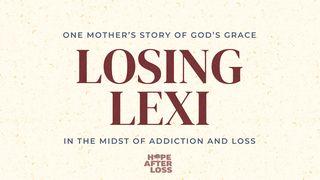Journey Through HebrewsSample

Intro
Nicole introduces this lesson on a sermon meant to move people to a place of security in their faith by exhortation.
Exhortations in Hebrews: In the Text
The exhortations of Hebrews may leave us wondering about our own “eternal security.” A careful look at this topic will show that this writer isn’t teaching anything we haven’t heard by Paul or Jesus himself.
The Future Inheritance of Believers
While Hebrews acknowledges that believers are currently “tasting the heavenly gift … and the powers of the coming age” (Heb 6:4-5, NIV) and are in the process of “receiving a kingdom that cannot be shaken” (Heb 12:28, NIV), it looks forward to a more complete fulfillment in a future age. The language of sight, of “looking” and “seeing,” features heavily in Hebrews’ anticipation of a future inheritance for believers. What they long for already exists but is as yet “invisible” or “unseen.”
Read Hebrews 11:1-31. If you are logged into a YouVersion account, highlight all the references to the future inheritance of believers that is as yet unseen. (If you don’t have a YouVersion account, use your Bible or another online Bible with a highlighting or underlining feature.)
In your reading of Hebrews 11:1-31, you might have highlighted the verses below, and perhaps others depending on your approach. These passages recall some of the “not yet” aspect of Paul’s theology. They remind us that while we are already located in Christ, the ultimate fulfillment of this membership is still beyond our view.
Now faith is confidence in what we hope for and assurance about what we do not see.
Hebrews 11:1 (NIV)
By faith we understand that the universe was formed at God’s command, so that what is seen was not made out of what was visible.
Hebrews 11:3 (NIV)
By faith Noah, when warned about things not yet seen, in holy fear built an ark to save his family. By his faith he condemned the world and became heir of the righteousness that is in keeping with faith.
Hebrews 11:7 (NIV)
All these people were still living by faith when they died. They did not receive the things promised; they only saw them and welcomed them from a distance, admitting that they were foreigners and strangers on earth.
Hebrews 11:13 (NIV)
Instead, they were longing for a better country—a heavenly one. Therefore God is not ashamed to be called their God, for he has prepared a city for them.
Hebrews 11:16 (NIV)
He regarded disgrace for the sake of Christ as of greater value than the treasures of Egypt, because he was looking ahead to his reward.
Hebrews 11:26 (NIV)
By faith he left Egypt, not fearing the king’s anger; he persevered because he saw him who is invisible.
Hebrews 11:27 (NIV)
Reference: Donald Hagner, Encountering the Book of Hebrews, 2002, p. 137.
The Eternal
Hebrews’ emphasis on the future inheritance of believers is balanced by its consistent references to the eternal. While we may not yet be able to see or fully experience our inheritance in Christ, it already exists. Many things about Christian faith direct our attention to a future time, but our redemption in Jesus is a reality for us today. The hope that we have is already realized—secured in him.
What Hebrews promises is not so much a future reality as it is a heavenly reality that we have yet to fully experience. Because of this emphasis, the word “heavenly” is also important in this book. Read the passages below that allude to the “eternal,” sometimes using “forever,” which has a similar meaning.
He entered once for all into the holy places, not by means of the blood of goats and calves but by means of his own blood, thus securing an eternal redemption. For if the blood of goats and bulls, and the sprinkling of defiled persons with the ashes of a heifer, sanctifyfor the purification of the flesh, how much more will the blood of Christ, who through the eternal Spirit offered himself without blemish to God, purify ourconscience from dead works to serve the living God.
Therefore he is the mediator of a new covenant, so that those who are called may receive the promised eternal inheritance, since a death has occurred that redeems them from the transgressions committed under the first covenant. Hebrews 9:12-15 (ESV)
Now may the God of peace who brought again from the dead our Lord Jesus, the great shepherd of the sheep, by the blood of the eternal covenant, equip you with everything good that you may do his will, working in usthat which is pleasing in his sight, through Jesus Christ, to whom be glory forever and ever. Amen. Hebrews 13:20-21 (ESV)
Referencing these verses, summarize who and what it is that believers can claim today, and eternally, while they wait for a future inheritance.
Eternal Security
About this Plan

Have you ever wished for a Bible study that could take you beyond surface-level reading? If so, get ready for our journey through the book of Hebrews! You'll get to immerse yourself in Scripture (by looking at key terms and ideas), explore what's behind it (by learning historical-cultural background), and also discover its impact by considering its implications, not only for you, but for the global church. Let's dive in!
More
Related plans

The DEEP Method: How to Discover, Explore, Engage, Practice God's Word

Unmasking Narcissism

When God Says No!

Creating to Heal: 7 Days of Healing Through Art & Prayer

Dog Dad Devotions on Leadership, Loyalty and Love

Mom Guilt Meets Grace

Daily Wisdom: A Proverb-a-Day

Losing Lexi: One Mother's Story of Grace in the Midst of Addiction and Loss

God Hears Every Prayer
